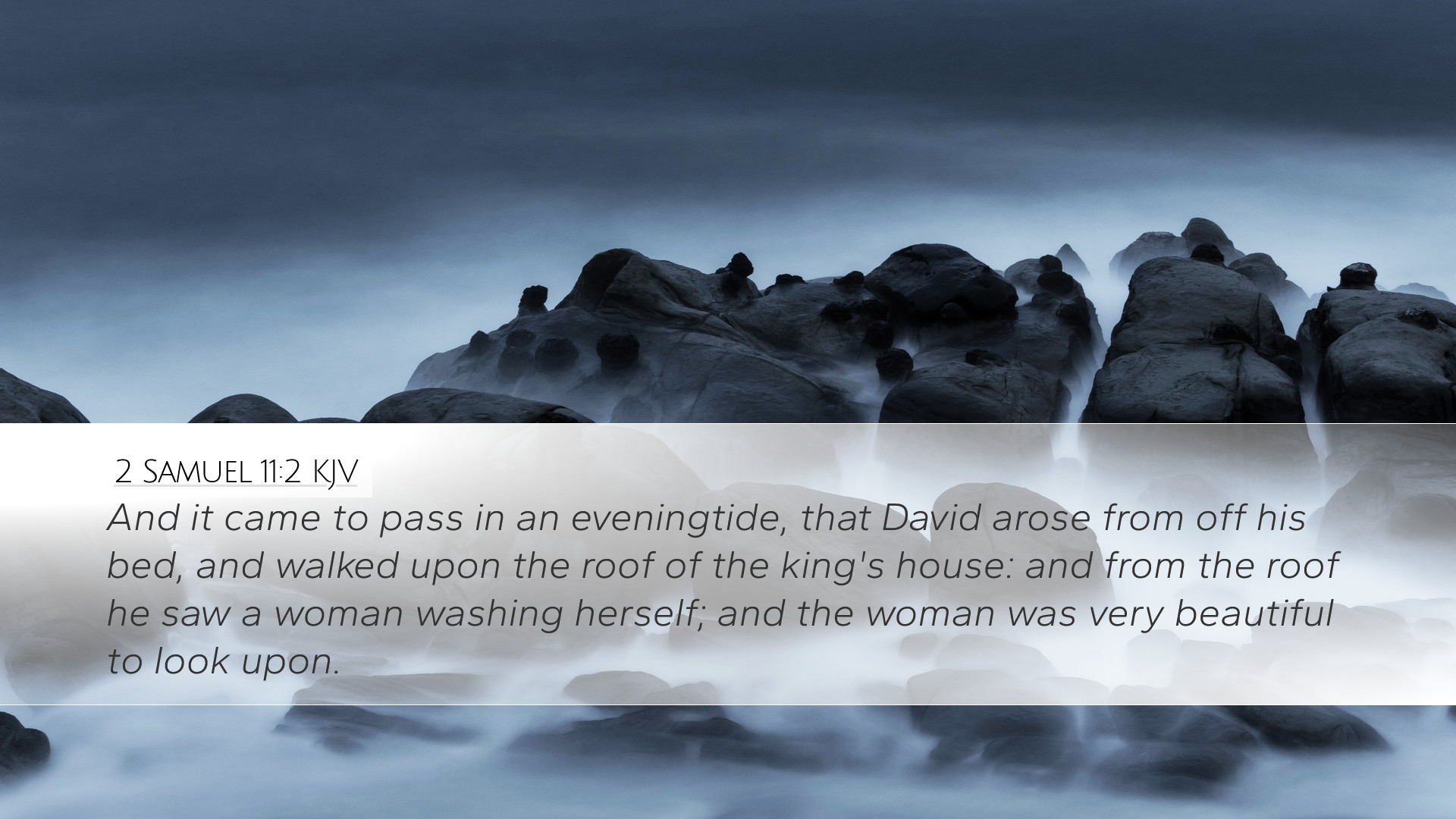Commentary on 2 Samuel 11:2
Verse: "And it came to pass, in an evening tide, that David arose from off his bed, and walked upon the roof of the king's house: and from the roof he saw a woman washing herself; and the woman was very beautiful to look upon." (2 Samuel 11:2 KJV)
Introduction
This verse marks the beginning of one of the most significant narratives in the life of David, showing the king's moral failure that would lead to grave consequences. It serves as a profound warning to both leaders and believers of the perils of temptation and the vulnerability that often accompanies times of leisure.
Contextual Background
This account occurs during a time of war, where kings typically led their armies into battle. David, however, remains in Jerusalem, illustrating a departure from his typical responsibilities. This lapse sets the stage for the events that follow. Public domain commentaries provide insights into the implications of David's decision to stay behind and how it opens a pathway to sin.
Examination of Key Elements
Evening Tide
Matthew Henry emphasizes the significance of the time frame indicated by "evening tide." It reflects a time of rest, but also a time when the mind may wander and become vulnerable to temptation. The evening symbolizes a transition, where one may let their guard down, providing fertile ground for sinful thoughts.
David’s Inactivity
Albert Barnes notes that David's idleness plays a crucial role in the narrative. Instead of engaging in the duties of kingship, he seeks comfort in the palace, highlighting a failure of leadership. This inactivity breeds the opportunity for sin to enter his life, suggesting that spiritual vigilance is necessary at all times.
The Roof as a Place of Observation
Adam Clarke elaborates on the "roof of the king's house," a place that provides a vantage point over the city. This detail is important as it symbolizes how power can lead to the misuse of authority. David’s position allowed him to see things not intended for his eyes, indicating a potential moral degradation tied to his kingship.
The Woman - Bathsheba
The woman described in the verse, later identified as Bathsheba, is presented as “very beautiful to look upon.” This emphasis on her beauty illustrates the allure of temptation. Matthew Henry points out that her beauty is both captivating and deceptive, leading David into greater sin. It reflects the biblical theme of beauty being both a gift and a potential snare.
Theological Implications
This verse highlights critical themes in biblical theology, including:
- The nature of temptation: The account serves as a poignant reminder that even the most faithful can falter. David’s failure illustrates that temptation often arises during moments of weakness and complacency.
- The gravity of sin: David’s seemingly innocuous act of watching leads to a series of disastrous choices. This elevates the understanding of how sin can multiply when not dealt with swiftly.
- Divine oversight: God's presence is felt even in the backdrop of sin, reminding the reader that all actions are subject to divine scrutiny.
Practical Applications
For pastors, students, and theologians, this verse provides several key takeaways:
- Vigilance in Leadership: Leaders must remain vigilant in both duties and personal conduct, recognizing that personal failures can have widespread implications.
- Addressing Inactivity: Encourage engagement in spiritual disciplines during times of rest or comfort, as idleness can prove dangerous.
- Understanding Temptation: Be aware of the settings and circumstances that make one susceptible to temptation, taking proactive measures to avoid them.
Conclusion
2 Samuel 11:2 serves as a cautionary tale within the broader narrative of David's reign. It invites reflection on the themes of leadership, the nature of sin, and the necessity of steadfastness in spirituality. David's actions remind us that even the greatest among us are not immune to moral failure, urging continuous diligence in the pursuit of holiness.


